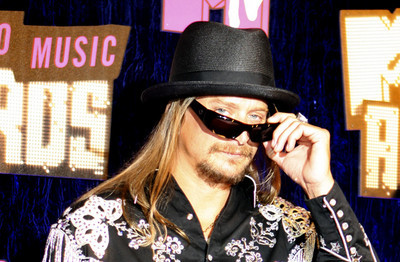BRIGHT LIGHTS, CONTROLLING CITY
Photographers stand camera to camera on the red carpet for the "Resident Evil: Extinction" premiere at Planet Hollywood Resort, a velvet rope demarcating the line they cannot cross once celebrities arrive.
They talk and sweat under the lights; check their gear; rock from foot to foot. Press check-in on this recent Thursday was 5:30 p.m.; celebrity arrivals start after 7. The veterans know, red carpet is a game of hurry up and wait.
A few minor celebrities trickle by -- members of a local band and some woman with a future singing career -- but it's not enough to stir most of the photographers from their red carpet trance.
Suddenly and without warning, the star of the movie, Milla Jovovich, appears and it's as though she personally breathed life into their cameras. The once semi-orderly line becomes a jumble of bodies and flashes while the night rings out with the song of the celebrity photographer: "Milla, to your right please." "Milla. Milla. Milla. Over your shoulder." "You look great. Here, please."
The rope strains against the pressure of a dozen photographers leaning forward, trying to get The Photo that will be picked up by People, In Touch Weekly, even the National Enquirer.
Although they're supposed to stay in their places marked by square, white placards, that isn't necessarily where the best shot is, says Scott Doctor, a photographer who works for Splash wire service and celebrity journalist Robin Leach.
"It's easier to ask forgiveness than to ask for permission," he explains later.
Finally, the celebrity flood gates open and all of the big stars arrive in a 15-minute span: Ali Larter, Oded Fehr, Sylvester Stallone, Ashanti.
As quickly as it started, it's over and photographers pack their gear and dissipate.
Their jobs may seem glamorous to the readers of celebrity magazines. Or it may seem sleazy to others. But celebrity photography, at least in Las Vegas, is neither, say the ones who do it.
"I know there's this aura that goes with it, but it's no different than shooting some salesman in an office," Doctor says. "A shoot is a shoot is a shoot."
The handful of celebrity photographers who live in Las Vegas are much like any photojournalist: They're documenting an event for a client. That happens to involve photographing the rich and famous posing, laughing, talking, walking and anything else they may do. They are not, they say, paparazzi.
"I'm Italian and paparazzi in Italian means stalking, I think. I'm not a stalker. We are invited; we are paid to be there. We are requested to be there," says freelance photographer Chris Farina. "We're celebrity photographers."
Paparazzi, on the other hand, are not invited. They often take photos that show celebrities in unflattering ways. And that doesn't fly in Las Vegas, says Denise Truscello, the lead photographer for the Las Vegas branch of Wire Image, a photo wire service.
Unlike New York, Los Angeles and other large cities where paparazzi lurk waiting to catch a star unaware, celebrity photographers in Las Vegas work with publicity companies, nightclubs and resort representatives on a daily basis. The photographers receive invitations to openings, parties, every event involving a celebrity. Publicists feed photographers tips to celebrity sightings and send tip sheets on planned appearances. Without the invitations, celebrity photographers would never be allowed to take photos on property, Truscello and Farina say.
"So it's in our best interest to stay on good terms with them," Farina says. "If you get the MGM or Venetian mad because you're chasing someone through the lobby, your reputation can be ruined. I've seen it happen, where a guy will be just blacklisted. You've got to be on good terms and play it cool if you're going to stick around, because your livelihood depends on it."
Even if they wanted to be paparazzi, celebrity photographers would have a hard time doing it here, says Hew Burney, the Hard Rock Hotel's in-house photographer.
Celebrities tend to stay on private property during their visits, rarely leaving a resort, Farina says, which cuts down on the opportunities to shoot them candidly.
Hotel security won't let you stand around a casino holding a camera, either, Doctor says. They'll kick you out.
"Las Vegas is different from L.A. or New York because these casinos don't want celebrities to be afraid to come," Truscello says. "They're pretty protected over here."
It's a competitive field, especially now that anyone with a digital camera can be a photographer, Doctor says. Magazines will run only so many photos of an event. Still, they make a comfortable living; the average rate for a wire service photographer is about $200 per event. Photographers are then paid a commission based on how the photo will be used.
Breaking into the field is hard; it helps to have experience and a willingness to work overnight, Burney says. Many have experience with newspapers. Despite the competition, there's a camaraderie among the local celebrity photographers, one they've developed after seeing each other time and again.
Truscello turns down paparazzi-style assignments all the time, she says. She respects the privacy of others and won't take a celebrity's photo unless the person is aware of it.
"I've probably lost tons of money but I don't care," she says. "I have my principles."
Some celebrity photos can sell for tens of thousands of dollars, depending on the star and what they're doing, photographers say. A picture of Paris Hilton without underwear is one example.
But just because photographers such as Truscello, Farina and Doctor won't take those shots doesn't mean they won't make that kind of money.
"The opportunity is always there," Farina says. "But you can't count on it. If you do, you'll be out of work."
Farina's photo of Andre Agassi kissing Steffi Graf in 1998 fetched him thousands. He declines to say how much.
"Let me put it this way: That photo paid for a nice, new van. And more," he says.


























